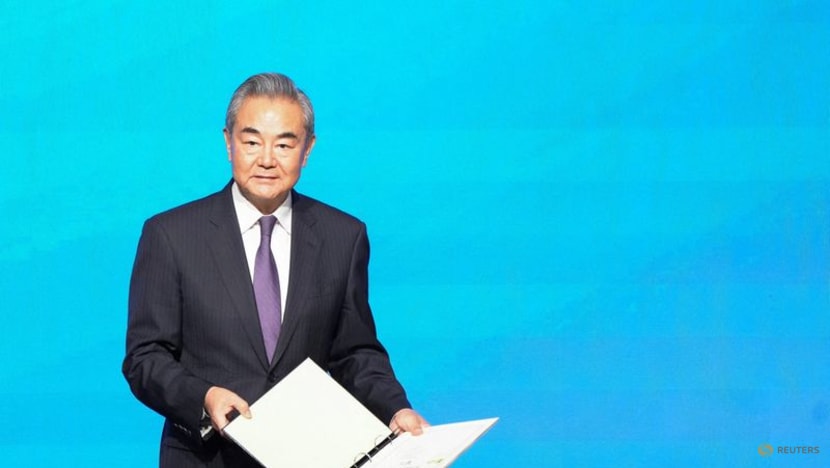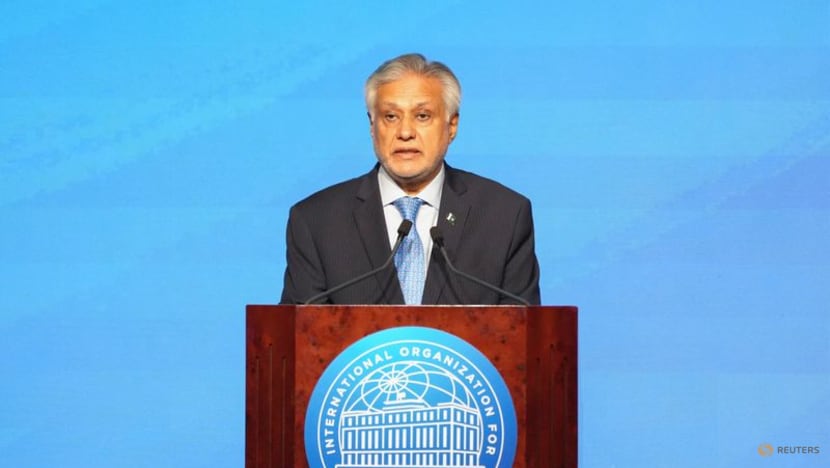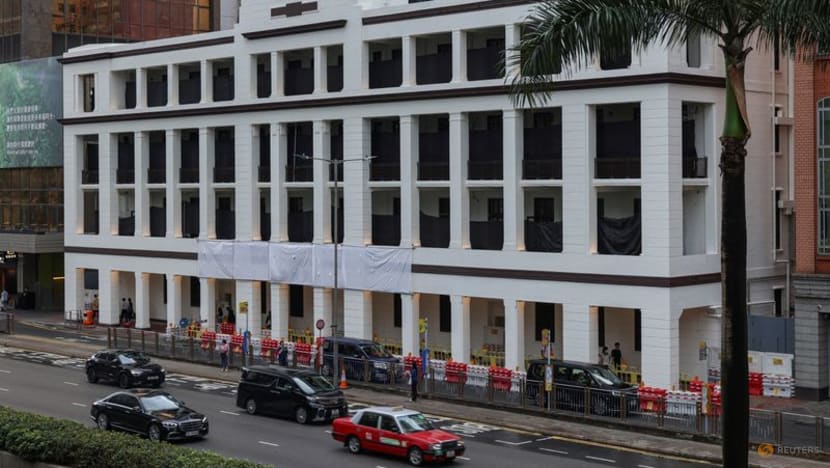analysis East Asia
'Culturally sensitive' mediation: Can a new China-led international outfit earn global trust?
Launched on May 30, the International Organisation for Mediation (IOMed) seeks to offer a “softer” alternative to Western-led dispute resolution. But analysts say hard questions remain over its neutrality and global credibility.

Chinese Foreign Minister Wang Yi attends the Signing Ceremony of the Convention on the Establishment of the International Organisation for Mediation (IOMed) in Hong Kong on May 30, 2025. (REUTERS/Bertha Wang/File Photo)

This audio is generated by an AI tool.
SINGAPORE: A new international mediation outfit spearheaded by China - with most of its founding members from Asia, Africa and the Caribbean - could serve as a “softer” alternative to existing dispute resolution bodies like the International Court of Justice (ICJ) and Permanent Court of Arbitration (PCA) that are perceived to be Western-led, analysts say.
Signed into law on May 30 at a ceremony in Hong Kong presided over by Chinese Foreign Minister Wang Yi, the International Organisation for Mediation (IOMed) aims to “resolve world issues through dialogue and understanding”.
“The establishment of the IOMed helps to move beyond the zero-sum mindset of ‘you lose and I win’,” said Wang, who also hailed it as an “innovative step in international rule of law”.
“It will fill an institutional gap in international mediation and serve as an important public good in the field of the rule of law for better global governance,” he added.
Analysts observe that the IOMed is being positioned as a model that is more acutely attuned to cultural sensitivities.
“What sets IOMed apart from institutions like the ICJ or PCA is its philosophical orientation,” said Kun Fan, an arbitrator and associate professor at the University of New South Wales (UNSW).
“While those global bodies centre on binding adjudication, IOMed will adopt a softer, consensus-based model grounded in mediation, compromise and cultural sensitivity,” she added.
Enthusiasm and support from developing countries have also signalled Beijing’s efforts to court the Global South, experts noted.
Global bodies like the ICJ, PCA and International Criminal Court (ICC), “lack objectivity and neutrality and cannot be trusted to deliver justice in global governance”, said Joyce Chimbi, a journalist from Kenya, one of 33 countries which joined the IOMed.
“Africa has long been dissatisfied with the existing world order, especially with international dispute settlement instruments bred in the West, which are often blind to the cultural sensitivities of African states and their societies,” Chimbi told the Chinese state tabloid Global Times after Friday’s signing ceremony.
She also noted the significant role China played in brokering a reconciliation between Saudi Arabia and Iran back in 2023 - a deal hailed as a major step towards peace and stability in the Middle East.
“When China brokered a reconciliation between Saudi Arabia and Iran in 2023, it proved that mediation comes with many advantages, including cultural sensitivities and inclusion. It is also cost-effective, flexible, convenient, fast and easy to implement,” Chimbi said.
Yet not everyone is convinced by China’s growing role as a global mediator.
In an era of tariffs, trade wars and heightened geopolitical tensions, analysts said the Chinese-led mediation body will need to earn global credibility and demonstrate impartiality in resolving conflicts.
“What would happen if its rulings differ from the ICJ and other global courts?” said political scientist Chong Ja Ian from the National University of Singapore (NUS).
WHO'S IN?
Thirty-three countries so far have signed up.
Among them, long-term Beijing allies like Cambodia, Pakistan and Belarus - and Pacific nations like Vanuatu, where competition between the US and China has been escalating. Also joining them are multiple African countries including Algeria, Ethiopia, Kenya, Benin, Cameroon, Uganda, Sudan and Zimbabwe.
“The signatories definitely lean towards (being) more China-friendly, but they are also generally countries China wants to court,” noted China analyst Robert Rust from the US science advocacy nonprofit the Union of Concerned Scientists (UCS).
“Most are also countries in the Global South where China wants to position itself as a global leader.”
Also on the list are Venezuela, Iran and Cuba, which Rust described as countries “targeted or excluded by the US and its connected international bodies to varying degrees”. And for now, the usual China-friendly countries like Russia, as well as Central Asian states, have not signed up as members.
In September 2013, China launched its Belt and Road Initiative which put once overlooked nations in Central Asia back on the map. A decade on, is the ambitious development project still as relevant?
Fan from UNSW also noted that several countries are Belt and Road Initiative (BRI) member-states.
“These early signatories signal that the IOMed is an institution clearly positioned within the BRI ecosystem,” she said.
"The aim is not simply to serve disputes but to offer more inclusive and culturally resonant institutional architecture that reflect BRI values and interests."

“NO LOSERS” IN MEDIATION
The ICJ, which has its seat in The Hague, is the world’s highest court - established after World War Two as a judicial organ of the UN to adjudicate disputes between countries and provide advisory opinions on issues arising under international law.
The Chinese-led IOMed will also function on the basis of international law, according to officials, but with a focus on resolving global disputes through mediation.
Its scope covers disputes between states, disputes between states and foreign nationals, as well as commercial disputes between private parties.
“Unlike the ICJ or the PCA, which adopt largely adversarial processes based on legal rights, the IOMed will use mediation,” said Lawrence Boo, a Singaporean professor and arbitrator, noting that there are “no losers” in mediated settlements.
While both arbitration and mediation involve neutral third parties, they differ in a crucial way.
An arbitrator hears evidence and makes a binding decision. A mediator, by contrast, does not decide the outcome - instead they facilitate difficult conversations to help disputing parties find a mutually acceptable solution.
“Mediation creates space for win-win solutions that foster long-term relationships and preserve sovereignty - priorities that resonate not only with China’s vision, but with many countries in the Global South that are seeking more balanced, inclusive dispute resolution mechanisms,” said Fan.
“In that sense, China’s leadership in establishing IOMed is both a strategic effort to shape international legal norms and a response to broader demands for more cooperative and culturally sensitive governance frameworks.”

IMPACT ON REGIONAL DISPUTE RESOLUTION CENTRES
The new mediation body, headquartered in Hong Kong, aims to cement the city’s presence as a top centre to resolve disputes between countries, Chief Executive John Lee said.
Work could begin as early as the end of this year, Hong Kong government officials said, revealing that the IOMed would later establish a secretariat and governing council.
Signatory countries will be eligible to nominate their own nationals as mediators, said Hong Kong’s Secretary for Justice Paul Lam.
“The acceptance and influence of the IOMed will depend much on how it will administer the organisation and more importantly, how professional are their mediators - they must get those in the field and not just political figures,” Boo said, adding that he was “hopeful initial reservations and anti-China bias would give way to pragmatic acceptance”.
Hong Kong is already an arbitration hub, tying with Singapore for second place, behind London, as the top choice for a seat of arbitration this year, according to the 2025 International Arbitration Survey conducted by Queen Mary University of London.
While some view the China-led IOMed as a potential competitor to existing dispute resolution centres in the region, analysts say the initiative is more likely to complement rather than displace established players in the region.
These include the Singapore International Mediation Centre (SIMC) and Singapore International Arbitration Centre (SIAC), both of which have earned reputations as leading institutions in Asia.
“We’re witnessing the emergence of a more multipolar dispute resolution ecosystem,” said Fan, describing it as multiple tracks “reflecting different legal traditions and institutional logics, which can be tailored to different users’ needs”.
Boo views IOMed’s arrival as a positive step - particularly in raising global awareness of mediation as a viable and often underused method of resolving international disputes.
“There is now an international organisation willing to champion mediation as the more appropriate form of dispute resolution,” he said.
Institutions like Singapore’s SIMC and SIAC will “continue to be relevant”, Boo said, suggesting that IOMed might need the “support of existing institutions to promote its cause”.
In his view, increased global awareness of mediation could in fact raise caseloads for SIMC, rather than divert them.
He added that arbitration and mediation are not mutually exclusive but “different nodes of resolving disputes” which could “grow in tandem without affecting the other”.
But IOMed’s primary focus would still be on state-to-state disputes as well as Investor-State Dispute Settlements (ISDS) - mechanisms in trade and investment agreements allowing for foreign investors to resolve disputes with foreign governments of countries they are investing in.
This is distinctive from commercial caseloads that dominate Singapore’s arbitration and mediation landscape, Boo said.
“IMPORTANT QUESTIONS” REMAIN
While China has said that the IOMed would adhere to international law and the United Nations Charter, experts have raised questions about its impartiality and credibility.
“Like many major global powers, China often tries to ignore or go around international legal proceedings and rulings which are not in their favour,” said Chong from NUS, noting that Beijing’s record of solving disputes tended to be “primarily political rather than legal”.
He recalled Beijing’s dismissal of a 2016 landmark PCA decision in the Hague, which ruled in favour of the Philippines - concluding that China had no legal basis to claim historic rights to the bulk of the disputed South China Sea.
“China’s new mediation body will ultimately serve as an alternative to the ICJ (by providing) a more suitable legal system which Beijing is comfortable with,” he said.
However, major questions remain, Chong said.
For instance, he questioned whether the IOMed would be able to rule against Beijing given that courts in both Hong Kong and mainland China have refused to do so in the past, and whether it could also re-litigate decisions made previously at the ICJ.
“Would this encourage other major powers to further ignore international law - if global rulings (elsewhere weren’t in their favour)? Could these major powers start setting up their own courts that conform more with their own legal systems and comfort levels?” he asked.
“These are important questions that remain unresolved and ultimately, more questions remain than answers.”


















